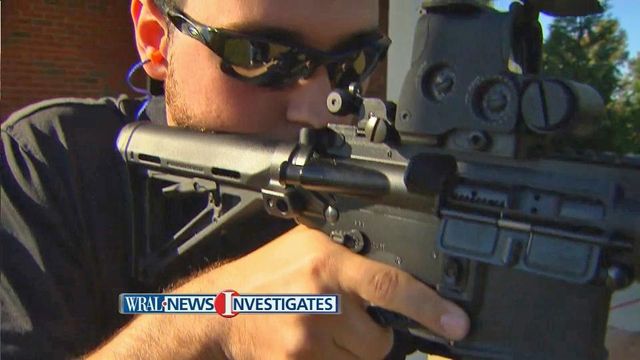WRAL Investigates: Owning high-powered weapons possible without normal ATF oversight
Short-barreled rifles and suppressors, also known as silencers, are types of weapons covered under the National Firearms Act. To get them, the process is much more thorough than buying a regular gun. But there's a legal way to avoid those checks and balances.
Posted — UpdatedMatt Reeves of Cary has a modified PS90 short barrel rifle, a weapon he has always wanted to own, “mostly for collector value,” he said. Because the barrel is shorter than 16 inches, it's more strictly regulated under the NFA.
Reeves bought the gun and the suppressor in Harnett County after the local sheriff signed off on his purchase. Now, he lives in Wake County.
“Any future applications I have as of right now will have to be through a gun trust because (Wake County Sheriff) Donnie Harrison will not sign off on my NFA application,” Reeves said.
Harrison says he will only sign NFA applications if the buyer is a collector, researcher, police officer, in the military or if the weapon is involved in corporate security.
For those who want short barrel rifles and suppressors but can't get a local sheriff's authorization, a gun trust is a legal avenue that is gaining popularity. It’s similar to a will in that it allows firearms to pass between generations. It allows one person to go through the rigorous background check and gives the trustee the power to legally share the weapons with others.
A quick Internet search shows local lawyers advertising for trusts so gun owners can bypass the local sheriff. Fayetteville attorney Drew Dempster specializes in gun trusts and said he doesn’t consider it a legal loophole.
“I would call it a legal protection of individuals who want to legally own these firearms,” he said.
A gun trust is a legal arrangement that allows guns be passed down to beneficiaries without court dispute. At the same time, anyone designated by the trust can possess NFA-regulated firearms.
The head of the trust must pass a criminal background check, submit extensive paperwork, pay $200 to the Bureau of Alcohol, Tobacco, Firearms and Explosives and wait about six months for a decision. Approval opens the door for anyone else named in the trust to own the guns without the same scrutiny.
Wake County's sheriff says he supports the Second Amendment but leans on his legal team to advise him about trusts.
Dempster said he writes trusts where all designees clear criminal background checks because, ultimately, the head of the trust remains liable.
“At the end of the day, we are just as concerned about individuals having guns because it makes our community not look very well,” he said.
Clay Ausley, who owns Fuquay Gun and Gold, said trusts and eased state restrictions on firearms help his sales.
Still, he questions why the law classifies short barrel rifles and suppressors differently. Military-style semi-automatic guns with the same ammunition don't require the same federal scrutiny.
“You can legally, if you've got a clean background and can pass a background check, you can purchase an AR-15 pistol, and you can purchase a full size AR-15. But, you cannot purchase (a short barrel rifle) without jumping through a whole bunch of hoops with the ATF in Wake County and get a gun trust set up,” Ausley said. “That makes absolutely no sense at all.”
Criminals aren’t going to jump through those hoops, Ausley says. “They’re going to buy them off the street or from an individual.”
Wake County’s sheriff says he still has reservations about trusts because they bypass his judgment on gun buyers.
“At some point in time, it’s going to be tested,” Harrison said. “I’m not sure who’s going to test it.”
The ATF has been considering a change to gun trusts that would make background checks mandatory for everyone named in the trust. The agency could make an announcement about changes – if any – as early as next month.
• Credits
Copyright 2024 by Capitol Broadcasting Company. All rights reserved. This material may not be published, broadcast, rewritten or redistributed.






